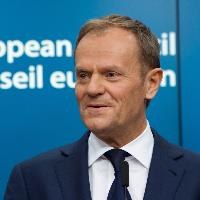(BRUSSELS) – European leaders at a summit in Brussels Thursday re-elected Donald Tusk as European Council president, despite angry objection from the eurosceptic right-wing government of his home country Poland.
An emotional Mr Tusk, re-elected by nearly all Member States of the EU, said he would “continue to work for a better and more united Europe with all Member States, without exception.”
The Polish government said it did not want to deal with Mr Tusk, who was Poland’s prime minister for 7 years, but it was left out on a limb when it tried to find support to block Mr Tusk’s re-election.
Mr Tusk, who has been appointed for a second term of two and a half years, till 30 November 2019, is the second full-time President of the European Council, following the creation of the post under the Treaty of Lisbon.
Despite the perils of Brexit, which the summit was due to debate later, there was good news on the European economy. In discussion with the president of the European Central Bank Mario Draghi, who left interest rates unchanged earlier in the day, growth was reported to be returning to all 28 members of the European Union, with 232 million Europeans now in work – the highest for years.
Mr Tusk said Europe remains the champion of open, rules-based trade. While it it would not hesitate “to defend ourselves against unfair trading practices wherever necessary,” the EU is now looking to conclude a free trade deal with Japan, and, in the words of Commission president Jean-Claude Juncker, to affirming to the world that “we remain a continent of rule-based free trade.”
When asked about how he could now work with Poland, Mr Tusk ended with a quote, which he said was not only addressed towards the Polish government: “Be careful of the bridges you burn, because when they are gone, you can never cross them again”.
European leaders are due later this evening to address the situation in in the Western Balkans, a region seen as vital for Europe, where tensions and divisions are out of hand, “partly because of unhealthy external influences which have been destabilising several countries for some time.” He wanted European leaders “to reconfirm the European perspective for the Western Balkans.”



